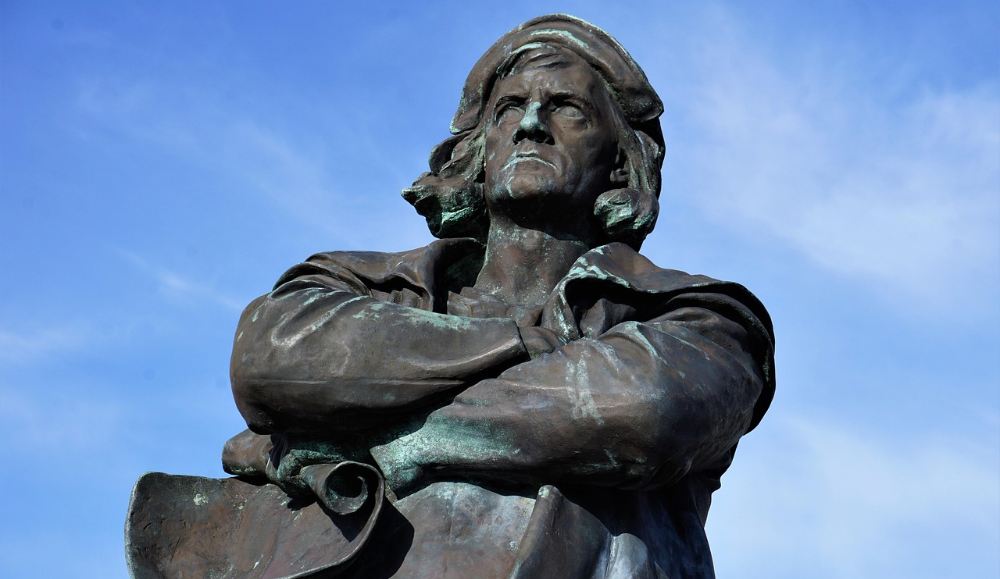Several years ago I saw the film 1492: Conquest of Paradise, starring Gerard Depardieu and directed by Ridley Scott. Long before that event I read Admiral of the Ocean Sea, the Pulitzer-winning biography of Christopher Columbus by Samuel Eliot Morison. Those experiences have direct bearing on our Pacific Northwest, notably the naming of the great Columbia River.
Who was the man Columbus? Morison tracked down written descriptions of him, as did researchers for the Ridley Scott film. In physical appearance he was apparently taller than the average man of his time and place. Most contemporary observers wrote that he was red-headed, ruddy-complexioned, blue-eyed, and had high cheekbones.
No contemporary portrait of him has ever been found. Columbus himself noted that his father’s hair had turned white by age 30. Columbus also wrote that his father held to a strict religiosity. Las Casas, the first Catholic priest to be ordained in the New World, and who knew the Admiral in Hispaniola (today’s Dominican Republic) in 1550, offers similar statements, and adds that he was “affable” in general conversation, but could be “forceful” in negotiations. Las Casas also noted that Columbus was intent upon teaching local Natives the Christian faith.
Morison notes that Columbus’s family tree had “modest origins,” and must be patched together from numerous notarial and municipal documents. In fact, it appears that Columbus came from illiterate Genoese stock, mostly weavers, clothiers, and cheesemongers. His name was likely taken from the story of St. Christopher, familiar to every child in the Middle Ages. He was raised as a strict Roman Catholic, and carried the names of the saint of travel.
Although historian Morison does not accept the possibility that Columbus may have come from Jewish antecedents, he nevertheless speculates on the matter. Other writers have been more forthright. Columbus certainly knew of the Spanish and Portuguese laws at that time expelling Jews from the Iberian Peninsula. Also, as an ambitious and intelligent man he was aware that his professional hopes relied on showing an obvious fealty toward the dominant Roman Catholic faith.
Although tyrannical methods to subjugate aboriginal peoples were eventually introduced by Columbus’ men, and many who followed, those outrages were rationalized by claims of “saving” ignorant heathens.
Columbus came from a common, not aristocratic, background. Despite those humble origins, he succeeded as a professional sailor, negotiator, and commander. He may have been a member of a persecuted race (a Jew) in a time when death or expulsion for that genesis could have been his reward. He was the first European to cross an endless sea that had defied and frightened scores of brave and well-educated men before him, and his skills as a navigator were without peer.
Biographer Morison, himself an experienced sailor, wrote that Chistopher Columbus “proved to be the greatest navigator of his age, and enabled him to train . . . captains and pilots” who would explore the world for decades. His name is rightly honored by the mighty river, the Columbia.
Discover more from Post Alley
Subscribe to get the latest posts sent to your email.

From the wikipedia article, he likely picked up his basic navigation strategy for getting there and back, with favorable trade winds at different latitudes, from his Portuguese father in law, as the Portuguese had already been doing it. He didn’t execute it right, but got lucky with the weather.
His idea of the distance to Asia was way off, thanks in part to his confusion between different Arab and Roman “mile” standards, and a number of better scholars knew it and dismissed his plan as unfeasible. Which it was. It just turned out well because there was a continent no one knew about.
Donn, not quite. He sailed exactly where he intended and never meant to go to India. In fact, the whole affair was a Portuguese trick against Spain. Portugal even sent Martim Behaim to Germany in 1492 to Mae a false globe putting Japan exactly where Columbus would come back to say it was. An amazing secret mission planned and executed perfectly. See the book COLUMBUS The Untold Story
This article is so out of touch with the research done in the last quarter century. May I suggest you read COLUMBUS versus COLÓN by Dr. Rosa. He has proven beyond doubt the Genoese Columbus story was falsified. http://www.MdRosa.com
Yes, he was Greek, from Chios!